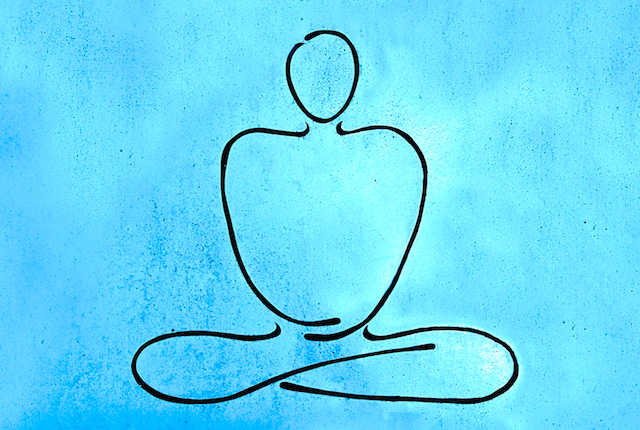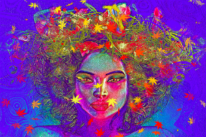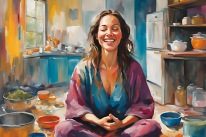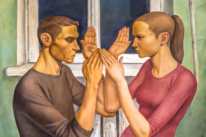
“You cannot keep running away from your fears. At some point in life you will have to build up the courage to face and overcome them.” ~Unknown
Last year my family and I relocated overseas from Australia to Singapore, which meant new jobs, new schools, new relationships—an entirely new way of living.
My husband was busy with his work, and I had two wide-eyed children looking up at mummy for direction. A part of me was excited for the challenge, but another part of me, of equal measure, was feeling overwhelmed by the prospect and struggling to let my feelings go. I also knew that the only way out of this emotional prison was through.
This chapter in my own zigzag journey has reconfirmed to me that we never have everything figured out. You think you’ve got it (eureka!), then life throws a curve ball and you take a temporary step backward. And that’s okay.
I would say I’m more of an introvert; give me a good book and I’m happy. Reflecting, writing, and analyzing come naturally to me, whereas extroverting is more of an acquired skill. So the hardest part of our new life, for me, was the social aspect.
Singapore has a large and diverse expat community, and we were welcomed with open arms—lunches, school events, BBQs. Yet being an introvert all of these well-intentioned invitations sent my ego into overdrive. For me, this was social overload, and it felt hard.
Being the new kid in town, I felt pressure to go to everything and be my best, shiny self (whoever that is). Yet, a few weeks into this I hit the pause button and jumped off the social escalator. I needed to recalibrate and find some healthy ways to support myself and my family through the change and adjustment.
To keep with the theme of new challenges, I took up Ashtanga yoga. I’d heard it was a powerful practice that helps us learn to be present with difficulty, and it sounded like exactly what I needed.
I picked up my yoga mat and took myself down to a local studio to thrash it out, Claire vs. ego.
The first morning I entered the studio, the teacher was supporting someone in a back bend while saying “trust yourself, let go.” The Mysore style of yoga is teacher supported as opposed to led, so you take yourself through the postures at your own pace.
He pointed to an empty space to roll out my mat, and his first words to me were “no one’s going to rescue you, so lets get to it.” (I’ll add here, for the record, that this yoga teacher is a former US National Gymnastics coach, so he doesn’t do light and easy!) My ego was well and truly confronted. This studio was not going to be a place to hide.
Yoga has a reputation for being about super hard, impressive postures and showing off your best active wear. Yoga is also about soul work. What I have found is a practice that challenges, confronts, and supports me.
The yoga mat became my metaphor for life and for my insecurities. I took my struggles to the studio; they spilled out on the mat, I worked with them, and then repeated the practice the next day. And as my body strengthened and my posture straightened, I felt stronger and straighter inside.
Some days were easier than others. On my better days, the dopamine was pumping and I took to my mat with a relaxed determination; on the not so good days, I sweated and strained and my mind was off planning what to cook for dinner that night. Such is life. We still show up and do what we can with what we have in that moment.
There were times (frequent times!) when I wanted to give up. My mind would say, “Claire, this is so hard and painful. Why are you putting yourself through this? Can you honestly be bothered? Just roll up your mat and let’s hot foot it home for a cup of tea. That’d make life so much easier.”
Similarly off the mat, at times it was tempting to hide away from new people for fear.
The community in Singapore is diverse, and the diversity and newness scared me. What if I couldn’t find anything in common with my new community that consisted of people from all over the world—India, Burma, Denmark, Norway, Germany and so on? What would we talk about? Would they like me? Would I like them?
A large part of me was crying out for the familiarity and security that my old life and friendships contained. I wanted to go to that BBQ with a garden full of familiar faces and be able to pick up a conversation (or sit in comfortable silence) with all the ease and intimacy that is earned over time.
In life, how often do we allow ourselves to side step new experiences because of our pain, discomfort, and fear? Fear of rejection, of failure, of success? But embracing life’s inevitable pain is the only way to grow and to live fully.
As my yoga teacher shared, “Claire, don’t mistake an opening for an injury, because they’re different. When you face your pain, be it a tight hip or an emotional wound, it’s going to hurt, but go through it, release the energy tied up there, and push through to the other side. This is where your freedom lies.”
My new tool, yoga, has helped me to release old tied up energy and better utilize my present day energy too.
Yoga has taught me to navigate the world with the language of feeling my body sensations, rather than solely thinking about them.
I can feel if my body is getting unnecessarily tense and tied up or if I’m losing energy ruminating or stressing about something, and that gives me a choice—I can stay in that state, even feed that state, which doesn’t feel too good; or I can chose to let the tension go, get my energy flow back on track, and handle my present day moment differently.
Familiarizing with my body in this way has brought a new level of awareness, or friendship toward myself, and helped me make better choices.
At one of the early community events I went to I put so much pressure on myself to be pleasing to everyone that I became somebody else—a nodding, smiling, frozen person. Who I was being felt unnatural and uncomfortable, so it wasn’t long before my little friend anxiety appeared.
With my new body awareness it clicked a lot sooner that I wasn’t being real and that I didn’t feel at home in myself. This new information gave me back my power and I was able to breathe and relax my way gradually back into myself.
These little emotional detours have been more frequent in Singapore, but I also know that they don’t have to mean anything. We don’t need to think about them, ascribe some complex theory to them, worry about them, and generally just fuel the fire.
These days I feel more able to normalize these uncomfortable body sensations and feelings with understanding. “I’m human, and this is a human experience. I’m okay.” Cue self-compassion.
So I guess I have let go of perfectionism.
What if life is about showing up, regardless of what happens, and having the courage to be seen? What if I allow myself to fail and to make mistakes? What if I accept and embrace that there is never going to be a perfect?
It really hasn’t all been as bad as my ego tried to claim it would be, either! In my yoga practice I’d had a strong aversion to doing a headstand. My teacher knew this, and every session he would make a beeline for me at headstand time and teach me to fall—over and over again, week after week. And I got good at falling.
Paradoxically, I also got better at my headstand. I found both the fall and the headstand actually weren’t as hard or as punishing as I had created them to be in my mind.
Similarly, over time and with practice, building new relationships with such a diverse range of people has become less daunting and actually incredibly fascinating.
Last week, I met with some other class parents for coffee and listening to the sharing of experiences from people from all over the globe was pretty amazing.
I’m pleased I’ve pushed through fear; otherwise, I wouldn’t have reaped the benefits or gained the life experience that I have from being part of this diverse community. And I’m pleased to say I’ve met some incredible people who have started to become firm friends.
Essentially, the pain and the fears (of falling from a head stand or making faux pas with potential new friends), while challenging, haven’t been as bad when I have actually faced them.
A move overseas aside, everyday life contains pain and discomfort. Fact. Being human we experience a continuous ebb and flow of pleasure and pain, joy and sadness, praise and blame, gain and loss, and so on.
Experiencing pain does not mean that there’s something wrong with you. Another fact. If we can keep learning to accept life, warts and all, and to “stay put on our mats” whatever we’re dealt, we gain more and more emotional freedom.
Pain, when faced, offers us the chance to grow and emerge some more—so for all it’s challenges, it’s actually a good thing. With the learning it provides comes the opportunity to make better choices for ourselves and to show up more fully for our lives.
Many of us, as children, never learned how to handle the inevitable pain of life, and there’s no shame in that. But it’s never too late to get curious and start working with our pain (wherever you are on the path) using supportive tools, people, and techniques. As we learn to let it go, we create the space where the magic happens.
About Claire Thomas
Claire Thomas is a registered Psychologist and founder of coaching business Raise your word (www.raiseyourword.com). A fascination with people first led Claire to study Psychology and over the past ten years, she has channelled that interest into a determination to help people access their unique gifts and lead more fulfilling lives.













 Though I run this site, it is not mine. It's ours. It's not about me. It's about us. Your stories and your wisdom are just as meaningful as mine.
Though I run this site, it is not mine. It's ours. It's not about me. It's about us. Your stories and your wisdom are just as meaningful as mine.
Great article Claire, many thanks for sharing. I used to practice yoga nearly every day at home, attending a twice weekly class. I have not kept up with this over the last few years and have only been practicing once or twice a week in total. You’ve encouraged me, through your reminder of how amazing yoga is, to take up the class again and make time for it due to the amazing benefits to the self. Thank you! Best wishes 🙂
Hi Frazer, that’s great to hear. Happy yoga-ering :)))
Yes, I second this. Having practiced yoga in the past, I found it to be a moment in time where I could tune out all around me and focus on my own wellbeing. Unfortunately, I have not done it in half a year. For whatever reason, it became an unessential part of my life.
Your article, your story, makes it perfectly clear that I must, we must find a way to incorporate some aspect of it, or at the very minimum something like it into our weekly routines.
Hi Joel thanks for your comment, I’m so pleased it’s reminded you of the fab benefits of yoga :))) and as you point out, yoga doesn’t have to be time consuming and complicated – you don’t even need to go to a studio – a free half hour, a mat and a sequence of postures and hey presto you’re away! Warm regards Claire
Couldn’t have come at a better timing for me. What an excellent article and food for thought! You have provided such encouraging words. Thank you!!
Thankyou Littlered 🙂 so pleased you have found the post of use.
Hi Claire, reader from Singapore here!
First of all, welcome to our sunny island!
Thank you for this article, it couldn’t come at a better time. Broke down just last night throwing a tantrum because I was feeling so upset. My family just moved from pasir ris to punggol less than 2 weeks ago and I am not adapting too well as i have lived in pasir ris all 22 years of life and my friends are all in that area. It upsets me so so much and it doesn’t help that my dad have vented a lot of anger at me during the move. It was really difficult for me. Thank you for the encouragement and also the reminder that I should continue my yoga classes again as i’ve stopped them for quite awhile.
Hi Ju, sorry to hear you have had some difficulties lately. Best wishes to you and your family, warm regards Claire ps thank you for the welcome to Singapore!!
I don’t know if this is the proper forum for this question – or for this plea for support and counsel – but I am intrigued by the theme of running away from fears. Avoidance has been one of my grand life strategies. I’ve avoided professional responsibility due to fears about my incompetence and, thus, have never earned more than $15,000 per year despite several advanced degrees.
I have also avoided intimate relationships. In fact, I am now 53 years old and have never asked a woman for a date (even for coffee), although I have wanted to and have fantasized about it. I am not a very attractive or wealthy or interesting person. Nevertheless, this is a fear I would like to address. How do I move forward while still carrying this shame? I’m supposed to be a better person and not beholden to fear. Any potential partner, or potential date, would not want to risk infection by such a fear-captivated soul. Any plan of action immediately gets derailed by these thoughts, not to mention the expectations of rejection.
Am I totally superficial to think about such things? Perhaps I should accept that intimacy is for other people, not for me?
Hi John, you are certainly not alone with these fears of intimacy yet wanting to feel connected and to belong. It’s a funny paradox! There’s no right or wrong way to manage these feeling and needs. And there’s no such thing as one size fits all. I think it’s about finding your own balance between intimacy and independence – working out what feels right for you, which will then help to alleviate some of the anxiety and avoidance. So stay with the process and if you feel you need more support to work things out it could be an idea to work with a psychologist/ therapist for a while. Warm regards and peace to you John, Claire
Hi John I am sorry to hear about your self doubts and fears. I struggle at times that’s why I decided to take some action, I have a wonderful therapist who has taught me about our subconscious mind which makes up 90% of our brain the conscious part only makes up 10% This means we have a very busy chatterbox at the back of our minds telling us we not good up rich enough, and like you just mentioned in your second paragraph “I am not very attractive or wealthy or interesting. This is all negative self talk, it is called our monkey mind no wonder your not feeling good about yourself. I am now in control of most of my negative self talk. I decided that firstly would I talk to my friend like that ” hey friend your not good enough or interesting and your not attractive!” I certainly would not and neither would you so change it round. I use lots of affirmations everyday to help myself. one of my favourite books and is read by people all over the world it s called “Feel the Fear and Do It Anyway” by Susan Jefferson. It is easy to read and after reading it it will change your mindset. Also a book by Brene Brown well all her books are great really this one is called The Power Of Vunerability and talks about being worthy of Love and Belonging and shame and so much more If you use Audible on Amazon or have a kindle I think these books could help you a lot! or you can just buy them Please try them Hope that helps!